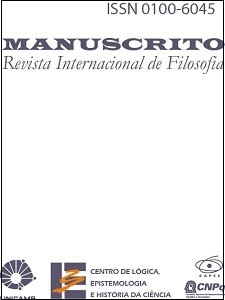Resumo
Is there progress in philosophy? This question is addressed along the three sections of this article. In the introductory section a comparison with similar questions which may be posed in connection to the arts and the sciences is made. A preliminar result of such comparison is that the same as in science the notion of progress in philosophy should be understood in an epistemic sense. However, if a notion of epistemic progress useful in the case of science is applied, a negative conclusion concerning the existence of such progress in philosophy may be easily reached.. In fact, a usual way of arguing for such negative conclusion is to recall the lack of consensus around any proposed solution of main philosophical problems and, hence, the existence of seemingly endless controversies around them. But against such conclusion I argue that a particular notion of progress – involving conceptual or intellectual enlargement and articulation is more appropriate to the nature of philosophy. Once such notion is adopted, consensus ceases to be a necessary condition for progress. In the second section, after defining the notion of controversial field as a set of interrelated controversies, a classification of main positions vis-a-vis philosophical controversial fields is proposed. The main distinction is between the mainstream view according to which lack of consensus and endless controversies are, to use Kant ́s words, the “scandal of philosophy” and an alternative view, advocated by Russell and Rescher, who praise the controversial status of philosophy as a way of preserving the plurality of our basic value commitments. Though recognizing the merits of those views, a serious flaw affecting all of them is pointed out, namely, their lack of attention to the actual development of controversial fields. After introducing such historical focus, the differences between different types of controversial fields are described. In particular, the difference between progressive and regressive types. Moreover, the differences between different stages in the development of controversial fields such as refocusing and substitution are also described. In the last section the preceding conceptual scheme is illustrated by sketching the development of twenty century philosophy of science through its main stages and controversial fields. Finally, na answer to the question posed at the beginning is provided: it is possible to assert the existence of progress in philosophy, in the sense introduced above, but only within the limits of controversial fields. If there is also progress between controversial fields is a question that may be doubted. It is not, in any case, dealt with in this article.
Referências
HACKING, I. (1983). Representing and Intervening (Cambridge, Cambridge University Press).
IBARRA, A. (2001). “Filosofía de la Ciencia Postpositivista. La reinven- ción de una disciplina”, Dianoia, vol. XLVI, no 46, mayo 2001.
LAKATOS, I. (1970). “The Methodology of Scientific Research Pro- grammes”, in I. Lakatos & A. Musgrave (eds.) (Cambridge, Cambridge University Press).
MCGUIRE, J.E. (1999). “Scientific Change: Perspectives and Proposals”, in M.H. Salmon et al. Introduction to the Philosophy of Science (Hackett).
RESCHER, N. (1995). The Strife of Systems (Pittsburgh, University of Pittsburgh Press). RUSSELL, B. (1912). The Problems of Philosophy (Oxford University Press; Galaxy Book (1959)).
WITTGENSTEIN, L. (1922). Tractatus Logico-Philosophicus (London, Routledge & Kegan Paul).

